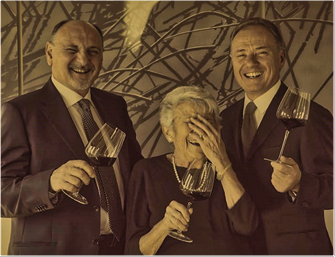
A c
The story of Cecchi Family is a simple one. In 1893, Luigi Cecchi, thanks to his wine-tasting talents, laid the foundations for the dynasty that is still known and appreciated today for the production of its high-quality wines. Luigi’s reputation is renown internationally, so much so that already during the ‘30s the family name began its unrelenting growth. In the ‘70s, the family moved to the municipality of Castellina in Chianti, a historical Chianti Classico production site, where the productive process that would then become the hallmark of constant quality began.
Between the end of the ‘80s and the beginning of the ‘90s, the Family chose to confront itself with different territories: San Gimignano, where it produces the Vernaccia, and the Maremma, with its Morellino. Here, today, the Cecchi Family represents one of the prominent names both for the extension of its vineyards and for the quality of its wines.
In the beginning of the ‘90s, Cecchi Family was the first Tuscany business to build a plant-based sewage-treatment facility of wastewater, in order to reduce energy consumption and reuse the purified water. In 2012, the plant was renewed and improved by the Val delle Rose company in Maremma, and then went on to win the Eco-Efficient Tuscany prize given by the Tuscan Region.
Cecchi considers protecting the environment a duty for those who work in the agricultural field. Territories are to be considered a heritage that must be defended and respected.
Thus, for this winery, the word “sustainability” takes on a true and hard-working character, driven by two well-defined policies: on one hand, the safeguard and improvement of the company, agricultural and environmental heritage; on the other hand, the reclamation and employment of new technologies that, moreover, allow the minimisation of both energy consumption and natural resources necessary during production.
Innovation has always been at the heart of the Cecchi Family’s entrepreneurial project, and has become a primary matter for investments in all sectors.
The agronomical part, for its undeniable relevance, is constantly the matter of continuous experimentations and controls, among which the use of new clones, the study of new forms of farming and vineyard operations, and the employment of new technologies. Research does not stop at just the vineyard, but rather it constantly aims to obtain even the slightest margins of improvement during the operational phases of the wine cellar.

WineLineTV, WineLineRadio and WineLine Marketing are wholly owned subsidiaries of Juris Corporation 255 S. Orange Avenue, Suite 101 • Orlando, Florida 32801
WineLineRadio.com
A series of audio conversations with leaders in the world of wine, dining reviews and portraits in wine. Listen and learn.
Go-Wine.com
The number one site for wine knowledge, timely articles, up to the minute weather in the vineyards, best wines and more.
Rsterlingscott.com
Robert Scott's Portfolio of Artworks including, Paintings, Mixedmedia, Photography and Limited Edition Corporate Art Program.
Wineliner.us
Wine oriented travel information and reviews of travel destinations, great places to visit, accomodations you can count on.